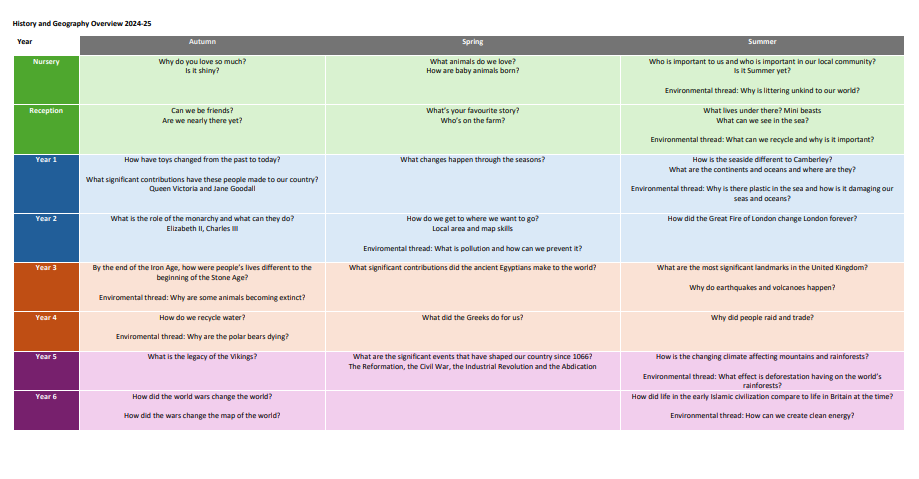History
Intent:
The intent of our history curriculum at South Camberley
At South Camberley, our pupils have a high quality history education which helps them to gain a coherent knowledge and understanding of Britain’s past and that of the wider world.
Through our curriculum, we develop the essential characteristics of historians in our pupils:
-
A genuine interest in history and inspiring pupil’s curiosity to know more about the past.
-
Equipping pupils to ask questions, think critically, weigh evidence, examine arguments, and develop their own perspectives and judgements.
-
Helping them to understand the complexity of people’s lives, the process of change, the diversity of societies and relationships between different groups as well as their own identity and the challenges of their time.
-
From EYFS up to the end of KS2, the children are continuously exposed to and taught to understand the important of chronology: about various historical events, where they take place within a historical timeline and famous historical figures, some of which have shaped the world today.
Implementation:
How we Teach History at South Camberley
Our school’s exciting and progressive history curriculum enables all children, regardless of background, ability or additional needs, to flourish through quality first teaching which brings the past to life and ignites curiosity. Our pupils are transformed into archaeologists, researchers and museum curators who interrogate the lessons left for us from the people of the past. We learn about how ancient civilizations have influenced the world we live in today, from the introduction of democratic society in Ancient Greece to the legacy of the Second World War. As British citizens and future leaders, our pupils understand the impact of the past on Britain today. For example, through our carefully constructed lessons around World War 1 and 2, we offer opportunities for pupils to consider a range of sources, including texts and artefacts, to make decisions about their historical reliability – we then apply this approach to considering how we can form our own decisions about the reliability of sources in modern Britain, e.g. the information shared on social media. Our history curriculum is enriched and enhanced by working across different subject areas. For example, in Year 6, pupils learn about democracy in Ancient Greece and visit the Houses of Parliament to support their Learning For Life lessons.
We use our wide array of technology to support us in history. Using our iPads, Chrome books, Now Press Play and Virtual Reality headsets gives our pupils an equal learning opportunity and transports them to a range of places around the world in order to contrast and compare the past. Our historians are given a variety of experiences both in and out of the classroom, to bring history to life and create memorable learning opportunities which embeds their understanding of the past. Some of our exciting enrichment opportunities include visits to Butser Ancient Farm, The Tower of London and Hampton Court Palace, in addition to workshops from Stone Age Man.
Impact:
By the time pupils leave South Camberley Primary and Nursery School, we want them to be historians who:
-
Are passionate about history and want to learn more
-
Are able to learn lessons from history in order to influence the decisions they make in their future lives
-
Have a strong understanding of chronology and when important events took place in the world
-
Have a depth of understanding about key moments in national history and how they have influenced and shaped Britain into the country it is today
-
Have a depth of understanding about some ancient civilizations and their legacy to the modern world
-
Have the key skills with which to flourish in their next stage of education, including: enquiry skills, critical thinking, analysis of evidence, presentation skills and effective questioning.
Curriculum Overview
“My favourite thing about History is getting to debate issues after we have looked at different sources – it makes it interesting.”
“It is important to learn about history to learn about the past and learn from their mistakes”
“My teacher is a good history teacher – she is enthusiastic and has a magical way to help us.”
South Camberley Pupils

